英语语法教程
- 格式:doc
- 大小:406.50 KB
- 文档页数:78

高中英语语法大全-精讲教程-CAL-FENGHAI.-(YICAI)-Company One1高中英语语法系统全解第一章动词时态在英语中,不同时间发生的动作或存在的状态,要用不同的动词形式来表示,这就叫做动词的时态。
一、一般时一般时包括一般现在时、一般过去时、一般将来时和一般过去将来时。
A.一般现在时1.一般现在时的构成一般现在时主要用动词原形来表示。
主语是第三人称单数时,动词后面要加-s 或-es。
They want good jobs.他们想要好的工作。
The coat matches the dress.外衣和裙子很相配。
This work does not satisfy me.这项工作我不满意。
Do you understand你懂了吗2.一般现在时的用法①一般现在时的基本用法 a. 表示现在习惯性的动作或存在状态He always takes a walk after supper.晚饭后他总是散散步。
Everyone is in high spirits now.现在大家都情绪高涨。
b. 表示客观事实或普遍真理The sun rises in the east and sets in the west.太阳从东方升起在西方落下。
Sound travels faster through water than it does through air.声音在水中的传播速度要比在空气中快。
Time and tide wait for no man.时间不等人。
c. 表示主语的特征、能力和状态This cloth feels soft.这布摸上去很软。
I love classical music.我喜欢古典音乐。
The President still seems able to find time to go fishing.看来总统仍能有时间去钓鱼。
d. 表示按计划或安排将要发生的动作The meeting begins at 7:00.会议七点钟开始。
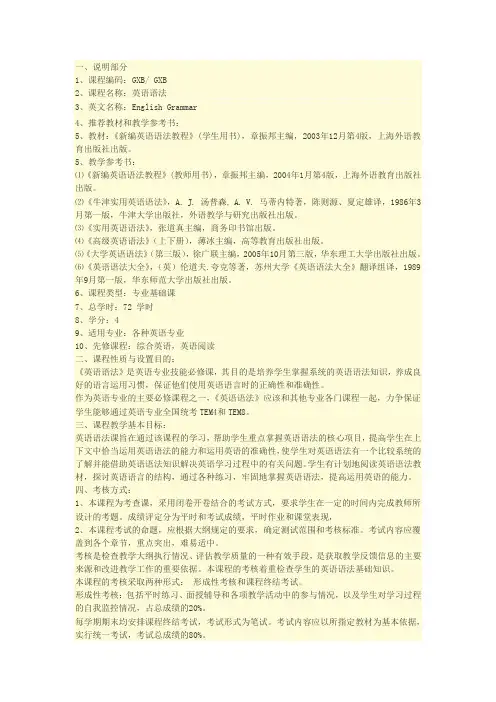
1、课程编码:GXB/ GXB2、课程名称:英语语法3、英文名称:English Grammar4、推荐教材和教学参考书:5、教材:《新编英语语法教程》(学生用书),章振邦主编,2003年12月第4版,上海外语教育出版社出版。
5、教学参考书:⑴《新编英语语法教程》(教师用书),章振邦主编,2004年1月第4版,上海外语教育出版社出版。
⑵《牛津实用英语语法》,A. J. 汤普森, A. V. 马蒂内特著,陈则源、夏定雄译,1986年3月第一版,牛津大学出版社,外语教学与研究出版社出版。
⑶《实用英语语法》,张道真主编,商务印书馆出版。
⑷《高级英语语法》(上下册),薄冰主编,高等教育出版社出版。
⑸《大学英语语法》(第三版),徐广联主编,2005年10月第三版,华东理工大学出版社出版。
⑹《英语语法大全》,(英)伦道夫.夸克等著,苏州大学《英语语法大全》翻译组译,1989年9月第一版,华东师范大学出版社出版。
6、课程类型:专业基础课7、总学时:72 学时8、学分:49、适用专业:各种英语专业10、先修课程:综合英语,英语阅读二、课程性质与设置目的:《英语语法》是英语专业技能必修课,其目的是培养学生掌握系统的英语语法知识,养成良好的语言运用习惯,保证他们使用英语语言时的正确性和准确性。
作为英语专业的主要必修课程之一,《英语语法》应该和其他专业各门课程一起,力争保证学生能够通过英语专业全国统考TEM4和TEM8。
三、课程教学基本目标:英语语法课旨在通过该课程的学习,帮助学生重点掌握英语语法的核心项目,提高学生在上下文中恰当运用英语语法的能力和运用英语的准确性,使学生对英语语法有一个比较系统的了解并能借助英语语法知识解决英语学习过程中的有关问题。
学生有计划地阅读英语语法教材,探讨英语语言的结构,通过各种练习,牢固地掌握英语语法,提高运用英语的能力。
四、考核方式:1、本课程为考查课,采用闭卷开卷结合的考试方式,要求学生在一定的时间内完成教师所设计的考题。

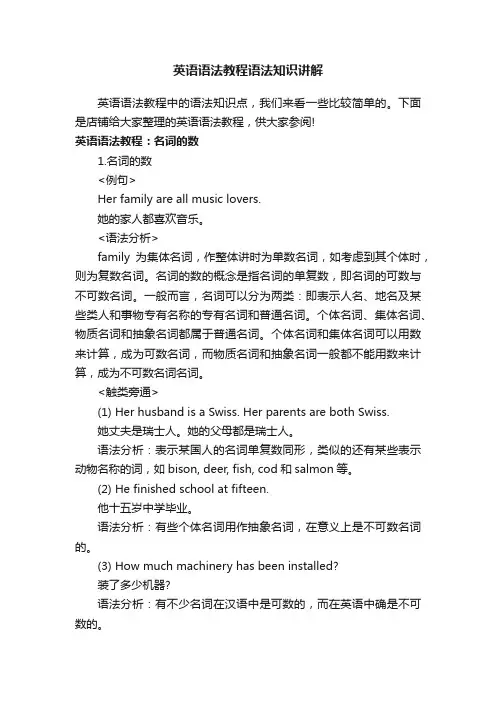
英语语法教程语法知识讲解英语语法教程中的语法知识点,我们来看一些比较简单的。
下面是店铺给大家整理的英语语法教程,供大家参阅!英语语法教程:名词的数1.名词的数<例句>Her family are all music lovers.她的家人都喜欢音乐。
<语法分析>family为集体名词,作整体讲时为单数名词,如考虑到其个体时,则为复数名词。
名词的数的概念是指名词的单复数,即名词的可数与不可数名词。
一般而言,名词可以分为两类:即表示人名、地名及某些类人和事物专有名称的专有名词和普通名词。
个体名词、集体名词、物质名词和抽象名词都属于普通名词。
个体名词和集体名词可以用数来计算,成为可数名词,而物质名词和抽象名词一般都不能用数来计算,成为不可数名词名词。
<触类旁通>(1) Her husband is a Swiss. Her parents are both Swiss.她丈夫是瑞士人。
她的父母都是瑞士人。
语法分析:表示某国人的名词单复数同形,类似的还有某些表示动物名称的词,如bison, deer, fish, cod和salmon等。
(2) He finished school at fifteen.他十五岁中学毕业。
语法分析:有些个体名词用作抽象名词,在意义上是不可数名词的。
(3) How much machinery has been installed?装了多少机器?语法分析:有不少名词在汉语中是可数的,而在英语中确是不可数的。
(4) There is a beauty in simplicity.朴实之中有一种美。
语法分析:在多数情况下抽象名词用于单数形式,某些时候,也可以在其前面加定冠词或不定冠词。
(5) Two beers, please.请来两杯啤酒。
语法分析:一般说来,物质名词是不可数的,因而没有复数形式,但有些物质名词用作可数名词可用来表示“一份”、“一杯”或“一种”等意义。
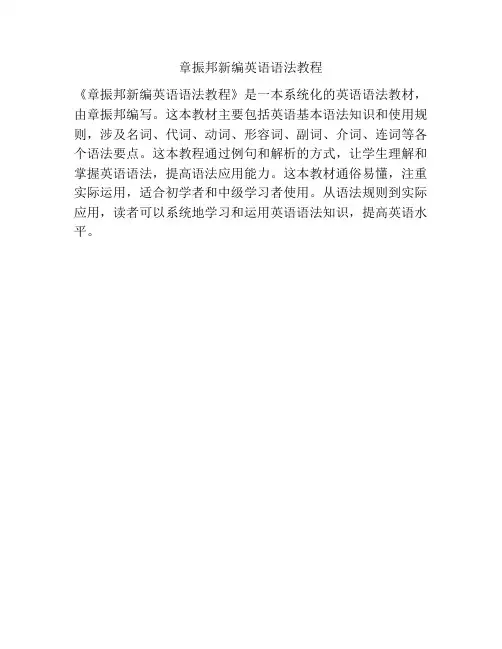
章振邦新编英语语法教程
《章振邦新编英语语法教程》是一本系统化的英语语法教材,由章振邦编写。
这本教材主要包括英语基本语法知识和使用规则,涉及名词、代词、动词、形容词、副词、介词、连词等各个语法要点。
这本教程通过例句和解析的方式,让学生理解和掌握英语语法,提高语法应用能力。
这本教材通俗易懂,注重实际运用,适合初学者和中级学习者使用。
从语法规则到实际应用,读者可以系统地学习和运用英语语法知识,提高英语水平。
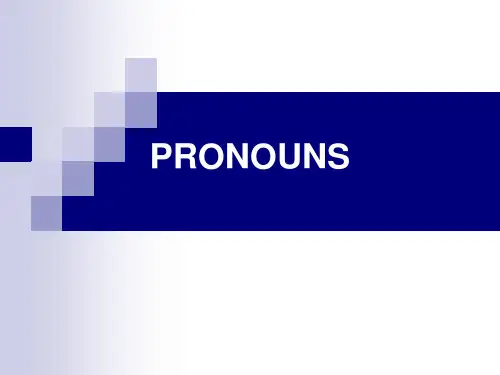
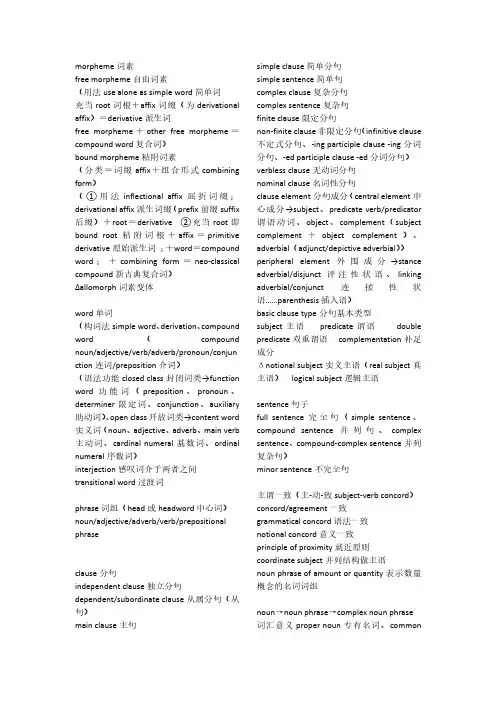
morpheme词素free morpheme自由词素(用法use alone as simple word简单词充当root词根+affix词缀(为derivational affix)=derivative派生词free morpheme+other free morpheme=compound word复合词)bound morpheme粘附词素(分类=词缀affix+组合形式combining form)(①用法inflectional affix屈折词缀;derivational affix派生词缀(prefix前缀suffix 后缀)+root=derivative②充当root即bound root粘附词根+affix=primitive derivative原始派生词;+word=compound word;+combining form=neo-classical compound新古典复合词)Δallomorph词素变体word单词(构词法simple word、derivation、compound word(compound noun/adjective/verb/adverb/pronoun/conjun ction连词/preposition介词)(语法功能closed class封闭词类→function word功能词(preposition、pronoun、determiner限定词、conjunction、auxiliary 助动词)、open class开放词类→content word 实义词(noun、adjective、adverb、main verb 主动词、cardinal numeral基数词、ordinal numeral序数词)interjection感叹词介于两者之间transitional word过渡词phrase词组(head或headword中心词)noun/adjective/adverb/verb/prepositional phraseclause分句independent clause独立分句dependent/subordinate clause从属分句(从句)main clause主句simple clause简单分句simple sentence简单句complex clause复杂分句complex sentence复杂句finite clause限定分句non-finite clause非限定分句(infinitive clause 不定式分句、-ing participle clause-ing分词分句、-ed participle clause-ed分词分句)verbless clause无动词分句nominal clause名词性分句clause element分句成分(central element中心成分→subject、predicate verb/predicator 谓语动词、object、complement(subject complement+object complement)、adverbial(adjunct/depictive adverbial))peripheral element外围成分→stance adverbial/disjunct评注性状语、linking adverbial/conjunct连接性状语……parenthesis插入语)basic clause type分句基本类型subject主语predicate谓语double predicate双重谓语complementation补足成分Δnotional subject实义主语(real subject真主语)logical subject逻辑主语sentence句子full sentence完全句(simple sentence、compound sentence并列句、complex sentence、compound-complex sentence并列复杂句)minor sentence不完全句主谓一致(主-动-致subject-verb concord)concord/agreement一致grammatical concord语法一致notional concord意义一致principle of proximity就近原则coordinate subject并列结构做主语noun phrase of amount or quantity表示数量概念的名词词组noun→noun phrase→complex noun phrase 词汇意义proper noun专有名词、commonnoun(individual noun、collective noun、mass noun/material noun、abstract noun)语法特征count/countable noun、non-count/uncountable nounnumber数→语法范畴singular number单数plural number复数(regular plural、irregular plural)partitive单位词(unit noun单位名词)case格→语法术语nominative case主格、genitive/possessive case属格/所有格、dative case与格、accusation case宾格→old English古英语genitive/possessive case、common case通格→modern English现代英语independent genitive独立属格double genitive双重属格determinerreferential meaning所指意义→specific reference特指、generic reference类指definite quantity确定数量indefinite quantity非确定数量分类:predeterminer前位限定词、central determiner、postdeterminerarticle冠词definite article定冠词indefinite article不定冠词zero article 零冠词definite specific reference确定特指(anaphoric specific reference后照应特指、cataphoric specific reference前照应特指、situational reference语境特指)indefinite specific reference非确定特指adjective形容词(open class)词的构成→one-word adjective单词形容词、compound adjective复合形容词句法功能→central adjective中心形容词、peripheral adjective外围形容词词汇意义→dynamic adjective动态形容词、stative adjective静态形容词词汇意义→gradable adjective等级形容词、non-gradable adjective非等级形容词modifier修饰语premodifier前置修饰语postmodifier后置修饰语subject complement、object complementΔcausative construction使役结构adverb→adverb phrase词的构成→simple adverb简单副词、derivative adverb派生副词词汇意义→adverb of mannar方式副词、adverb of degree程度副词、adverb of frequency频度副词、adverb of time时间副词、conjunctive adverb连接副词(the head/headword of the verb phrase when used as a linking adverbial/conjunct)usage①modifier②adverbial (adjunct/depictive adverbial修饰性状语、disjunct/stance adverbial评注性状语、conjunct/linking adverbial连接性状语)比较等级和比较结构比较等级:当adjective和adverb用于比较结构时采取的特殊的语法形式比较结构:形容词和副词比较等级用于句子当中便形成了比较结构gradable可等级的positive/absolute degree原级comparative degree比较级superlative degree最高级comparative degree and superlative degree both have two forms→regular form and irregular formregular form has two expressions①synthetic form综合形式(add suffixes-er or-est to the positive/absolute degree)②analytic form分析形式(add more or most before positive/absolute degree)comparative construction比较结构gradable noun可等级名词Δnucleus调核代词pronoun(closed class封闭词类)personal pronoun人称代词(person人称形式→first/second/third第一/二/三人称)possessive pronoun物主代词=genitivepronoun属格代词(按语法功能分类→nominal genitive pronoun名词性属格代词、determiner genitive pronoun限定词性属格代词词)possessive determiner物主限定词(my、your 等)reflexive form反身形式reflexive pronoun反身代词(9个)(用法→emphatic use强调性用法、unemphatic use 非强调性用法)reciprocal pronoun相互代词demonstrative pronoun指示代词demonstrative determiner指示限定词demonstrative指示词interrogative pronoun疑问代词relative pronoun关系代词indefinite pronoun不定代词(分类→numeral 数次和quantifier量词、compound pronoun 复合代词)referent对象=antecedent先行项pronoun reference代词照应(anaphoric reference前照应、cataphoric reference后照应、situational reference情景照应;personal reference人称照应、demonstrative reference 指示照应)Δnoun of common gender通性名词、pro-verb代动词介词prepositionsimple/complex preposition简单/复杂介词、two-word/three-word/four-word preposition 双词/三词/四词介词Δanalytic language分析性语言、word order 词序(nomal order正常词序=natural order 自然词序)动词与动词词组verb动词(main verb主动词、auxiliary助动词→primary auxiliary基本主动词、modal auxiliary情态助动词、semi-auxiliary半助动词=semi-modal半情态助动词)Δmarginal modal auxiliary边际情态助动词(need、dare 等)verb phrase动词词组(simple verb phrase简单动词词组、complex verb phrase复杂动词词组、finite verb phrase限定动词词组、non-finite verb phrase非限定动词词组)notional verb实义动词contracted form缩略形式transitive verb及物动词(monotransitive verb 单宾语及物动词、ditransitive verb双宾语及物动词、complex-transitive verb复杂及物动词)intransitive verb不及物动词、linking verb 连系动词dynamic verb动态动词、stative verb静态动词single-word verb单词动词、phrasal verb词组动词(verbal idiom成语动词)regular verb规则动词、irregular verb不规则动词finite verb限定动词、non-finite verb非限定动词finite form限定形式、non-finite form非限定形式base form原形grammatical form语法形式(5种)Δmodal idiom情态成语时tense、体aspectpresent tense现在时、past tense过去时progressive aspect进行体、perfective aspect 完成体simple present/past一般现在时/过去时present/past progressive现在/过去进行体present/past perfective现在/过去完成体present/past perfective progressive现在/过去完成进行体future tense将来时pure future单纯将来语态voiceactive/passive voice主动/被动态active/passive sentence主动/被动句BE-passive be-型被动态GET-passive get-型被动态mood式(语气)subjunctive mood虚拟语气、indicative mood 陈述语气、imperative mood祈使语气hypothetical meaning假设意义=non-factual meaning非事实意义BE-subjunctive be-型虚拟、were-subjunctive were-型虚拟情态意义表示法ability能力、possibility可能、permission许可、obligation义务、necessity必然、prediction 预见、assumption推测、willingness意愿、intention意图、determination决心epistemic推测性、non-epistemic非推测性Δparaphrase意译非限定形式non-finite form①infinitive不定式to-infinitive带to不定式、bare infinitive不带to不定式Δsplit infinitive分裂不定式②-ing participle-ing分词(present participle 现在分词、gerund动名词)③-ed participle-ed分词(past participle过去分词)dangling participle悬垂分词(unattached participle无依着分词)attachment rule依着法则Δabsolute construction独立结构relative clause关系分句(restrictive relative clause限制性关系分句、non-restrictive relative clause非限制性关系分句)double relative clause双重关系分句embedded relative clause/pushdown relative clause嵌入式关系分句relative word关系词(relative pronoun关系代词、relative adverb关系副词、relative determiner关系限定词)attributive clause定语从句antecedent先行项、old information旧信息、given/known information已知信息register语域style语体statement陈述句(declarative sentence)emphasizer强调词、reinforcement tag强调附加结构、double negative双重否定、rhetorical question修辞疑问句、operator操作词、intonation pattern调型(low fall低降调、high fall高降调、low rise低升调、fall rise 降升调)question疑问句(interrogative sentence)(分类→general/special/alternative/tag一般=yes-no question是非问句/特殊=wh-question wh问句/选择/附加疑问句)command祈使句(imperative sentence)、exclamation感叹句(exclamatory sentence)interrogative exclamation问句型感叹句、echo exclamation重复感叹句existential sentence存在句complex existential sentence复杂存在句finite existential sentence限定存在句non-finite existential sentence非限定存在句locative adverbial地点状语temporal adverbial时间状语Δrheme述位IT-句型和否定结构non-referring it非指代性itassertive word肯定词non-assertive word非肯定词negative word否定词semi-negative半否定词scope of negation否定范围focus of negation否定焦点transferred negation转移否定double negation双重否定local negation局部否定pleonastic/superfluous negation多余否定并列结构coordinate structure coordinator并列连词correlative coordinator关联并列连词quasi-coordinator近似并列连词compound sentence并列句asyndetic coordination不带连词的并列结构syndetic coordinate带连词的并列结构predication述谓成分parallelism排比(作为修辞手法的并列结构)、parallel construction排比结构climax高潮从属结构subordinate construction subordination从属subordinator从属连词simple subordinator简单从属连词(one-word subordinator单词从属连词)complex subordinator复杂从属连词correlative subordinator关联从属连词marginal subordinator边际从属连词same time同时性earlier time先时性later time后时性nominal relative clause名词性关系分句nominal that-clause名词性that分句nominal wh-clause名词性wh-分句adverbial clause of time/place/manner/cause/result/purpose/co ndition/concession/accompanying circumstances时间/地点/方式/原因/结果/目的/条件/让步/伴随状语分句条件句conditionalreal conditional真实条件句unreal conditional非真实条件句implied conditional含蓄条件句basic form基本形式variant form变体形式alternative form替换形式直接引语和间接引语direct speech直接引语indirect speech间接引语reporting word引述动词free direct speech自由直接引语free indirect speech自由间接引语修饰modificationsquinting modification偏斜修饰、discontinuous modification分隔修饰、transferred modification转移修饰、partial modification局部修饰、multiple modification 多重修饰premodifier前置修饰语、postmodifier后置修饰语、restrictive modifier限制性修饰语、non-restrictive modifier非限制性修饰语、transferred modifier/epithet转移修饰语、squinting modifier偏斜修饰语contrastive meaning对比意义替代substitutionnominal/verbal/clausal名词性/动词性/分句性替代substitute替代词(nominal/verbal/clausal substitute名词/动词/分句替代词)省略ellipsis、situational ellipsis情景省略强调emphasis、rhetorical repetition修辞重复postponement后置、end focus句尾焦点、end weight句尾重心、periodic sentence尾重句、loose sentence松散句、trailing sentence 拖沓句fronting前置、inversion倒装(full inversion 完全倒装、partial inversion部分倒装cleft sentence分裂句、pseudo-cleft sentence 假分裂句focus element中心成分morphology词法、syntax句法、text语篇(=discourse口语中)、sentence group句群(语段)、paragraph段落、correctness正确性、appropriacy适合性、unity统一性、coherence连贯性、cohesion 粘着性、mobility流动性、clearness清晰性logical connector逻辑纽带、grammatical connector语法纽带、lexical connector词汇纽带literary language文学语言、textual rhetoric 语篇修辞标点符号punctuationperiod/full stop/stop句号、question mark问号、exclamation mark感叹号、comma逗号、semicolon分号、colon冒号、ellipsis省略号、dash破折号、brackets/parentheses括号、quotation mark引号、hyphen连字号、apostrophe撇号、slant斜线、italics斜体、underlining下划线、。
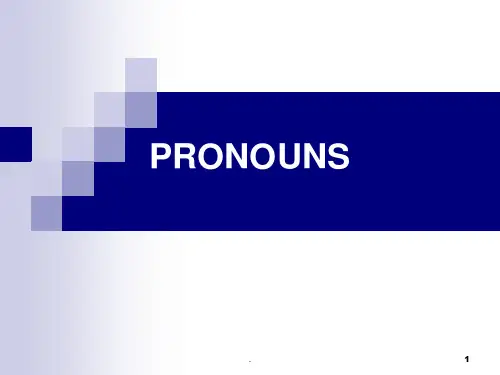
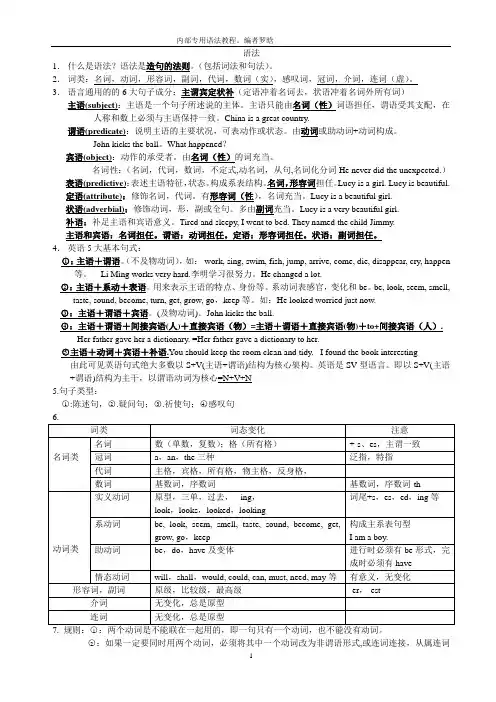
语法1.什么是语法?语法是造句的法则。
(包括词法和句法)。
2.词类:名词,动词,形容词,副词,代词,数词(实),感叹词,冠词,介词,连词(虚)。
3.语言通用的的6大句子成分:主谓宾定状补(定语冲着名词去,状语冲着名词外所有词)主语(subject):主语是一个句子所述说的主体。
主语只能由名词(性)词语担任,谓语受其支配,在人称和数上必须与主语保持一致。
China is a great country.谓语(predicate):说明主语的主要状况,可表动作或状态。
由动词或助动词+动词构成。
John kicks the ball。
What happened?宾语(object):动作的承受者。
由名词(性)的词充当。
名词性:(名词,代词,数词,不定式,动名词,从句,名词化分词He never did the unexpected.)表语(predictive):表述主语特征,状态。
构成系表结构。
名词,形容词担任。
Lucy is a girl. Lucy is beautiful.定语(attribute):修饰名词,代词。
有形容词(性),名词充当。
Lucy is a beautiful girl.状语(adverbial):修饰动词,形,副或全句。
多由副词充当。
Lucy is a very beautiful girl.补语:补足主语和宾语意义。
Tired and sleepy, I went to bed. They named the child Jimmy.主语和宾语:名词担任。
谓语:动词担任。
定语:形容词担任。
状语:副词担任。
4.英语5大基本句式:○1:主语+谓语。
(不及物动词),如:work, sing, swim, fish, jump, arrive, come, die, disappear, cry, happen 等。
Li Ming works very hard.李明学习很努力。
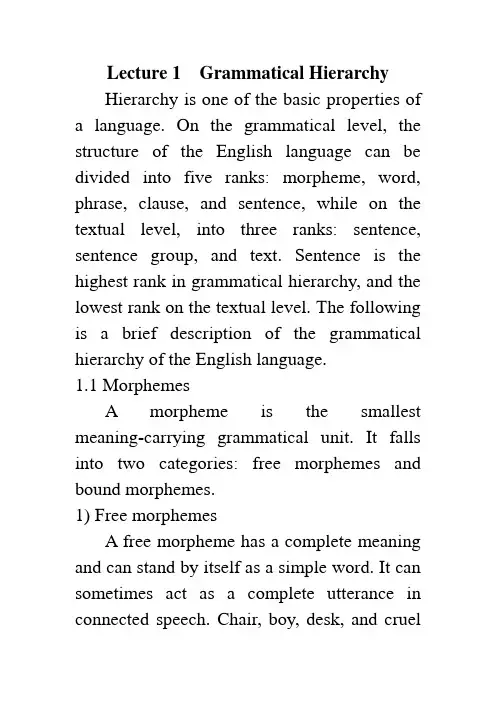
Lecture 1 Grammatical HierarchyHierarchy is one of the basic properties of a language. On the grammatical level, the structure of the English language can be divided into five ranks: morpheme, word, phrase, clause, and sentence, while on the textual level, into three ranks: sentence, sentence group, and text. Sentence is the highest rank in grammatical hierarchy, and the lowest rank on the textual level. The following is a brief description of the grammatical hierarchy of the English language.1.1 MorphemesA morpheme is the smallest meaning-carrying grammatical unit. It falls into two categories: free morphemes and bound morphemes.1) Free morphemesA free morpheme has a complete meaning and can stand by itself as a simple word. It can sometimes act as a complete utterance in connected speech. Chair, boy, desk, and cruelare free morphemes. A free morpheme can be the root of a derivative, such as kindly, friendliness.2) Bound morphemesBound morphemes are mostly affixes. They are also meaningful, but the meaning is not complete in itself unless it is attached to some other form. Therefore, a bound morpheme cannot stand by itself: it only exists as an affix or a combining form.The affix can be divided into two types: inflectional and derivational. Inflectional affixes include: plural –s/-es, possessive –’s, third person singular-s/-es, past –ed, participle –ing, participle –ed, comparative –er, and superlative –est. Derivational affixes can be further divided into prefixes and suffixes, such as anti-war, co-exist, movement, and careless. The use of an inflectional affix does not change the identity of a word, but that of a derivational affix usually results in a new lexeme.Bound morphemes can also be combining forms, which can act as bound root to form primitive derivatives, such as receive, conceive, and perceive. They can also be used together with other combining forms or words to form compound words or neo-classical compounds, such as minibus, miniskirt, biology, telescope, and electrocardiogram.1.2 WordsThe word is composed of one or more than one morpheme. Words can be classified in two ways:1) Simple words, derivatives & compoundsWords that are composed of one morpheme only are called simple words. art, joy, kind, up, down, hand, foot and able, for example, are simple words.Words that are formed by adding an affix to an existing word are called derivatives. For example, interference, unhelpful, driver, management, unfair, disloyal, and nonviolent are derivatives.A word formed by combining two or more bases is called a compound. For example, whichever, snowfall, downfall, bookcase, home-made, tax-free and babysitting.2) Closed-class words & open-class wordsIn terms of syntactic function, words can be classified into closed-class words and open-class words. Closed-class words refer to those sets of words whose items are “closed” or limited in number and are only exceptionally extended by the creation of additional numbers. In English, function words such as auxiliaries, conjunctions and prepositions are closed-class words.Open-class words refer to those sets of words whose items are indefinitely extendable. New items are constantly being created and old items are giving place to new ones. Nouns, verbs, adjectives, and adverbs form open-class words.1.3 PhrasesThe phrase is composed of one or morethan one word. Generally, the phrase is a group of words organized in a specific way with a key word as its head. The head determines the class of the phrase and the way in which the words are organized.1) The noun phraseThe noun phrase is a phrase with a noun as its head. The general pattern of a noun phrase is :(determiner+) (premodifier+) noun (+ postmodifier)a pretty little girl standing at the doorall the wooden cottages that have survived the earthquake2) The verb phraseThe verb phrase which is a phrase with a main verb as its head can be simple or complex. A simple verb phrase is just a main verb or “modifier + main verb”. A complex verb phrase is a main verb preceded by an auxiliary (or auxiliaries) (+modifier). For example:He works hard.He has been working on the project for two weeks.In the first example, “works” is a simple verb phrase; and in the second example, “has been working” is a complex verb phrase.In terms of grammatical form, a verb phrase can be finite or non-finite. A finite verb phrase is initiated by a finite form, that is, a verb that bears tense distinction. A non-finite verb phrase is a phrase initiated by a non-finite form, that is, a verb that does not change its form according to tense or subject.3) The adjective phraseThe adjective phrase is a phrase with an adjective as its head. The general pattern of an adjective phrase is:(modifier+) adjective (+postmodifier/complementation)The course is not very difficult.You are not careful enough.The weather is too hot to be enjoyable.4) The adverb phraseThe adverb phrase is a phrase with an adverb as its head. The general pattern of an adverb phrase is:(modifier+) adverb (+postmodifier)Be a man. Don’t act so slowly.She spoke very clearly indeed.He lives very far from the station.5) The prepositional phraseThe prepositional phrase is a phrase with a preposition as its head. The general pattern of a prepositional phrase is:(modifier+) preposition + complementation That story is based on an incident in his own life.Food had been scarce since before the war.He has been working in the lab all through the night.I could hear their footsteps directly above my head.1.4 ClausesThe clause is composed of one or morethan one phrase. A full-fledged clause is structurally a sequence of phrases and logically a construction of “subject + predicate”.1) Independent and dependent clausesIn terms of grammatical function, a clause can be independent or dependent. An independent clause is a clause that can stand by itself and act as a complete utterance, as distinguished from a dependent clause, which forms only part of another clause or of a phrase.He knows everything about it. (independent)I am sure he knows everything about it. (dependent)2) Simple and complex clausesWhen a clause consists of only one construction of “subject + predicate”, it is a simple clause. An independent simple clause is at the same time a simple sentence. When a clause comprises another clause or otherclauses as its element or elements, it is a complex clause. An independent complex clause is at the same time a complex sentence.It was not true. (simple)What he said was not true. (complex) 3) Main and subordinate clausesIn a complex clause, the clause that takes another clause as its element is the main clause, while the clause that is embedded in a large clause, either as a clause element or as part of a phrase which realizes a clause element, is a subordinate clause, e.g.:She wouldn’t believe it (m ain) though it was true (subordinate).If winter comes(subordinate), can Spring be far behind (main)?4) Finite, non-finite and verbless clausesA clause can be finite or non-finite. A finite clause is one with a finite verb phrase as its predicate verb or predicator; a non-finite clause is one with a non-finite verb as its predicator. For example:He barely ate or slept that night. (finite clause)He began paging through old newspapers, hoping to find some valuable information. (non-finite clause)When a clause is marked by the absence of any form of verb element, it is a verbless clause. A verbless clause is a “subject + predicate” construction with the verb element omitted, e.g.:When in Rome, do as the Romans do.1.5 SentencesThe sentence is the highest rank of grammatical unit. Based on one or more than one clause, the sentence is also the basic linguistic unit of connected discourse; it can stand alone and perform a function in social communication. Thus, a sentence can be defined as a grammatical unit that can stand by itself and perform a communicative function.1) Full and minor sentencesA full sentence is a sentence with anexpressed subject and predicate. It is mostly used in formal speech and writing. A minor sentence is only a sentence fragment which, in some specific contexts and situations, can stand by itself and perform a communicative function. Minor sentences, which are extensively used in informal discourse, can also be used to emphasize an idea, add force to an emotion or help build up to a climax at the beginning or the end of a paragraph. For example:Charlie Chaplin was the great comedian of silent films. (full)Where does Joan begin a mystery story? On the last page. Always. (minor)2) Simple, compound, complex and compound-complex sentencesA simple sentence is a sentence that comprises only one independent clause. Two or more coordinated independent clauses make a compound sentence. An independent clause that comprises one or more dependent clausesas its element(s) makes a complex sentence. Two or more coordinated independent clauses with at least one complex clause make a compound-complex sentence. For example: The bull charged straight at the man. (simple)She is a funny girl, yet you can’t help liking her. (compound)How it all happened is a mystery to me. (complex)As I had limited time, I didn’t read the last chapter, yet I still enjoy the book. (compound-complex)。
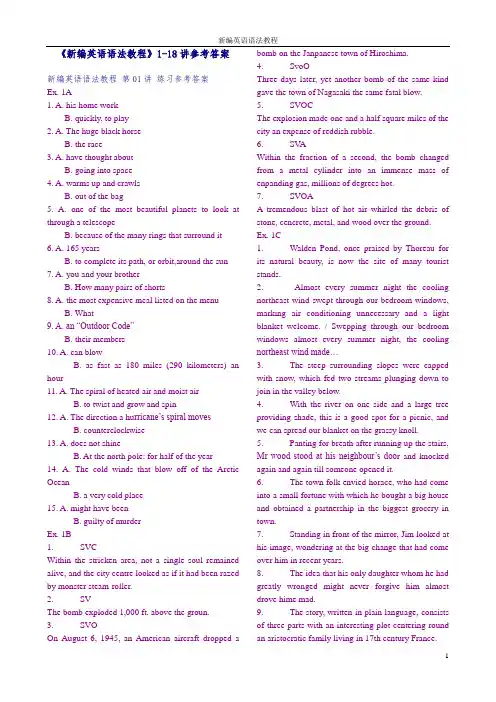
《新编英语语法教程》1-18讲参考答案新编英语语法教程第01讲练习参考答案Ex. 1A1. A. his home workB. quickly, to play2. A. The huge black horseB. the race3. A. have thought aboutB. going into space4. A. warms up and crawlsB. out of the bag5. A. one of the most beautiful planets to look at through a telescopeB. because of the many rings that surround it6. A. 165 yearsB. to complete its path, or orbit,around the sun7. A. you and your brotherB. How many pairs of shorts8. A. the most expensive meal listed on the menuB. What9. A. an “Outdoor Code”B. their members10. A. can blowB. as fast as 180 miles (290 kilometers) an hour11. A. The spiral of heated air and moist airB. to twist and grow and spin12. A. The direction a hu rricane’s spiral movesB. counterclockwise13. A. does not shineB. At the north pole: for half of the year14. A. The cold winds that blow off of the Arctic OceanB. a very cold place15. A. might have beenB. guilty of murderEx. 1B1. SVCWithin the stricken area, not a single soul remained alive, and the city centre looked as if it had been razed by monster steam-roller.2. SVThe bomb exploded 1,000 ft. above the groun.3. SVOOn August 6, 1945, an American aircraft dropped a bomb on the Janpanese town of Hiroshima.4. SvoOThree days later, yet another bomb of the same kind gave the town of Nagasaki the same fatal blow.5. SVOCThe explosion made one and a half square miles of the city an expense of reddish rubble.6. SV AWithin the fraction of a second, the bomb changed from a metal cylinder into an immense mass of enpanding gas, millions of degrees hot.7. SVOAA tremendous blast of hot air whirled the debris of stone, cencrete, metal, and wood over the ground. Ex. 1C1. Walden Pond, once praised by Thoreau for its natural beauty, is now the site of many tourist stands.2. Almost every summer night the cooling northeast wind swept through our bedroom windows, marking air conditioning unnecessary and a light blanket welcome. / Swepping through our bedroom windows almost every summer night, the cooling northeast wind made…3. The steep surrounding slopes were capped with snow, which fed two streams plunging down to join in the valley below.4. With the river on one side and a large tree providing shade, this is a good spot for a picnic, and we can spread our blanket on the grassy knoll.5. Panting for breath after running up the stairs, Mr wood stood at his neighbour’s doo r and knocked again and again till someone opened it.6. The town folk envied horace, who had come into a small fortune with which he bought a big house and obtained a partnership in the biggest grocery in town.7. Standing in front of the mirror, Jim looked at his image, wondering at the big change that had come over him in recent years.8. The idea that his only daughter whom he had greatly wronged might never forgive him almost drove hime mad.9. The story, written in plain language, consists of three parts with an interesting plot centering round an aristocratic family living in 17th century France.10. Mud-covered and shivering, John sat hunched over a bowl of hot broth prepared by his father to drive off the chill.11. Far above the waters of a beautiful lake and over the tops of the tall pime trees growing on the steep ofa hill stand five Chinese-style pavilions.12. Farther down the street, the old man stopped and leaned against a lamp-post, listening to a cheerful song coming out of a restaurant on the oppsite side of the street.13. Sarah sank in the nearest chair, completely exhausted, her limbs stiff with cold, her mind a piece of blank.14. Throughout the day Mrs Rymer behaved very properly, her pleasant, refined face wearing a grave look, her elegant figure wrapped in deep mourning while occasionally she uttered a sigh or a sob.15. Tony thought it necessary to break the news to his family, that Mr Jacob, his former employer, had promised him a half-day job at 20 pounds a week. 16. The thought that he might have wronged his friend who had rendered him good services on many occasions troubled his mind, already overburdened with worries and cares.17. The men of the disbanded royal bodyguard, suddenly turned loose onto the street of a capital seething with unrest, unemployed and perhaps disgruntled at their abrupt dismissal, were a potentially dangerous element.18. For many years London has been a business centre with hotel accommadation for visiting businessmen toghter with well-to-do travellers but completely inadequate for the swarms of shour-stay tourists landing at Heathrow or disembarking at Dover.19. Nearing the top, he climbed recklessly faser and faster, his eyes already glowing with triumph, but suddenly he slipped and fell, tumbling to the ground and lying motionless there, a crumpled pile of arms and legs.20. Bertrand Russell was one of the very few persons who have received both the Order of Merit, which was conferred on him by the British government in 1949, and the Nobel Prize for literature, conferred in Norway in 1950.新编英语语法教程第02讲练习参考答案Ex. 2A1. come2. are3. has / have4. are5. are6. are7. was / were8. is9. costs 10. were 11. are 12. are 13. was 14. are 15. lie 16. were 17. are 18. is 19. is 20. was 21. Has 22. were 23. is 24. is 25. are 26. is 27. are 28. cover, are 29. is / are 30. was/wereEx. 2B1. were2. have3. is, is4. was5. were6. is7. is8. are9. is 10. are, are11. have 12. are, their, their 13. was, It, was 14, It / They, is / are 15. are, their, they, disapprove 16. were, they 17. was 18. are 19. were 20. were新编英语语法教程第03讲练习参考答案Ex. 3A1. is2. was3. is4. has5. were6. means7. is8. is9. is 10. is 11. were 12. sells 13. is 14. are 15. are 16. are 17. is 18. is 19. was 20.provides 21. are 22. was 23. stops 24. is 25. is 26. does 27. produces 28. is 29. is 30. was Ex. 3B1. ’s2. are3. is4. are5. is6. was7. is8. were9. is 10. ’s 11. is 12. is, is, is 13. are 14. is 15. have 16. is 17. are 18. looks 19. are 20. are 21. understand 22. has 23. was 24. have 25. was 26. was 27. are 28. is 29. is 30. was 31. is 32. is / are 33. leaves 34. is / are 35. are 36. are 37. is 38. comes 39. is 40. live 41. are 42. points / point 43. are 44. is 45. are 46. was 47. is / are 48. is 49. has 50. wasEx. 3C1. is / are2. is / are3. is4. is / are5. is / are6. remain7. is8. are9. has / have 10.care / cares 11. is 12. plays 13. is 14. am 15. are / is 16. was 17. is, has 18. was 19. come 20. is新编英语语法教程第04讲练习参考答案Ex. 4A1. description2. arrangement3. attendance4. peculiarity5. expectation6. argument7. dependence 8. originality 9. exaggeration10. measurement 11. purity 12. persistence 13. extension 14. statement 15. generosity 16. entrance 17. loneliness18. forgetfulness 19. happiness 20. seriousness Ex. 4B1. strange sounds2. foods are3. chief, tribes, their, salmon (s)4. The runners-up were given pound notes / The runners-up were each given a pound note.5. bodies, their heroes6. mice, tooth-marks7. Crises, occur, families8. / 9. / 10. these businesses 11. / 12. fruits are13. / 14. these articles are well written 15. / 16. several personal kindnesses17. / 18. sufferings 19. professors 20. children are playing, sandsEx. 4C1. experience2. waters3. for advice4. an important piece of information5. for it is fun6. were not numerous7. Poultry8. directors are9. militia 10. geniuses 11. merchandise has 12. sympathies 13. experiences 14. were times, rivalry 15. clippings, were 16. lookers-on 17. foliage is 18. photos 19. 12-pages 20. Luggage isEx. 4D1. blade2. piece3. choir4. flash5. lump6. gang7. grain8. head9. staff 10. collection 11. fleet 12. cluster 13. bundle 14. bunch 15. team 16. piece 17. ear 18. bar 19. herd 20. pack 21. flock 22. crowd / swarm 23. troupe 24. bench 25. grove 26. collection 27. suite 28. squadron 29. band 30. libraryEx. 4E1-5 BCADC 6-10 CBDAB 11-15 ADBBC 16-20 BDCAB新编英语语法教程第05讲练习参考答案Ex. 5A1. my father has a car2. the bull has horns3. the prisoner escaped4. her parents consented5. somebody released the prisoner6. somebody assassinated the President7. a letter from the general / the general sent a letter8. the crowd felt sympathy9. a college for women10. a summer day, a day in the summer11. the earth has a (rough) surface12. the absence lasted ten days13. a doctoral degree, a doctorate14. the bird made the nest15. the committee made a report16. a story told by the girl / the girl told a story17. the volcano erupted18. the victim had courage / the victim was courageous19. somebody punished the boy20. the critics recevied the play in a hostile manner Ex. 5B1. The comedian performed, and he was well received by a huge audience.这位喜剧演员的演出很受广大观众的欢迎。
1A1B2AWithin the stricken area,not a single soul remained alive,and the city centre looked as if it had been razed by a monster steam-roller.The bomb exploded 1,000 the ground.On August 6,1945,an American aircraft dropped a bomb on the Japanese townof Hiroshima.Three days later,yet another bomb of the same kind gave the town of Nagasakithe same fatal blow.The explosion made one and a half square miles of the city an expanse of reddishrub-ble.Within the fraction of a second,the bomb changed from a metal cylinder into an im-mense mass of expanding gas,millions of degrees hot.A tremendous blast of hot air whirled the debris of stone,concrete,metal,and woodover the ground.2BPond,once praised by Thoreau for its natural beauty,is now the site of manytourist stands.2. Almost every summer night the cooling northeast w ind swept through our bedroom windows, making air conditioning unnecessary and a light blanket welcome./ Sweep-ing through our bedroom windows almost every summer night,the cooling northeastwind made...3. The steep surrounding slopes were capped with snow, which fed two streams plungingdown to join in the valley below.the river on one side and a large tree providing shade,this is a good spot for apic-nic,and we can spread our blanket on the grassy knoll.for breath after running up the stairs,Mr Wood stood at his neighbour's doorand knocked again and again till someone opened it.town folk envied Horace, who had come into a small fortune with which hebought abig house and obtained a partnership in the biggest grocery in town.in front of the mirror,Jim looked at his image,wondering at the big changethat had come over him in recent years.idea that his only daughter whom he had greatly wronged might never forgive himalmost drove him mad.9. The story, written in plain language, consists of three parts with an interesting plot cen-tering round an aristocratic family living in 17th-century France.and shivering,John sat hunched over a bowl of hot broth prepared by hisfatherto drive off the chill.above the waters of a beautiful lake and over the tops of the tall pine treesgrowingon the steep slopes of a hill stand five Chinese-style pavilions.12.Farther down the street,the old man stopped and leaned against a lamp-post, listeningto a cheerful song coming out of a restaurant on the opposite side of the street.sank in the nearest chair,completely exhausted,her limbs stiff with a piece of blank.the day Mrs Rymer behaved very properly,her pleasant,refined facewearing a grave look,her elegant figure wrapped in deep mourning while cold,her mind occasionallyshe uttered a sigh or a sob.thought it necessary to break the news to his family,that Mr Jacob,his former employer,had promised him a half-day job at 20 pounds a week. 3A,I will have to...,I was...,there has been...,Roberts returned the cheque.5.Oddly enough, he did not...unreasonably, he protested...,he never knew that he...,the two sides may...9.Quite obviously, he does not want to...enough,the burglar had not taken...enough,a solution will be...,the Chinese people protested...more important, we ought to put...,I have met him before.15.To our regret,he refused ourinvitation. ,someone managed to find me.telephoned the hospital first,quiterightly. ,the girl did not ask your name.,her appointment has not been confirmed.20.Curiously, the dog never barked.3Bother wordsother words/That is to say5. In that caseallall thata result;Secondly;Thirdly and most importantly 4Ahavewere,arearewere4B,is,are,their,their,It,wasThey,is/are,their,they,disapprove ,they5A5B 1.'s10.'s ,is,isareare point are5C are areare arehave caresis,has 6A6Bmuch work have you done this morning?dig a tunnel will need a great amount of labour.'s done the least work.4.There are several methods of approaching this problem.know little French.must be less empty talk but more practical work.7.Were there many people at the reception?I have a few words with you?9.There were fewer people today at the exhibition than yesterday.made the fewest mistakes.'ve learnt more poetry and done more exercises than I have.'s done the most work and made the most mistakes.'s done a lot of work and made a lot of mistakes.millionaire has lots of money-and lots of worries.has enough worries because she hasn't got enough money.telephone rang every few minutes.have been persisting in making the experiment all these last few cold days.his next books on English linguistics will come out in 2020.we learned that we had to wait another three more weeks.brother spent $1,000 for a second-hand car,but I spent almost twice the amountfor the same stuff. 7Aadviceimportant piece of information it is funnot numerousarehastimes,rivalry,wereisis7Bswarm7C1.... Dick's decision to emigrate to Australia.expansion of the Physics Department/The Physics Department's expansion...3....a novel of Jane Austen's.long report of Mr Allen's...new shoes of yours...6....the article of the student...7....Shakespeare's tragedies/the tragedies of Shakespeare8....a ship's carpenter.punishment of the offenders...10....the past decade's events/the events of the past decade11....the enemy's unconditional surrender/the unconditional surrender of the enemy.12....other people's criticism of him.13....the younger generation's education/ the education of the younger generation.14....at John Wiley's,the bookseller's.15....an article of '...16....this policy of the government's...?17....an idiot's tale.dog of Frank's...book of Joe Hill's...'...7Aleg of the table is broken.Key to Exercises 229and John's house is on the corner.3....on birds'nests.4....the students'problems.5. ... at the Joneses'.6./7.... Charles' car but someone else's.8....in ten years'time.9. The products'effectiveness...week's news...than the last two weeks'.11....others'problems.12....each other's worries.13.My brother and sister-in-law's house... friend of my father's...wheel of the car...16./17.The baseball players'wives...18....women's clothing only.ton's long poems.new shoes of yours...8A8B.,money,etc,ones,cause8C8A1....little opportunity to travel.2....many such novels.3..../ Neither sentence is correct English.4. He has many more problems...5....this kind of apple/ these kind(s)of apples.enjoy either kind,...7....every book in the fiction section.8....than in any other country in the world.9....a greater amount of rainfall this year than there was last year.10....all this luggage/all the luggage at the airport.11....such beautiful poetry/such a beautiful poem that it is hard to believe shehas neverhad a formal education.12....a great many friends in New York.13.Whatever nonsense...third sister of his...can't for the life of me remember.there are fewer/ less diseases...17....than all other methods.18.... once every three months.19....study of language.20....some more soup?8EOf all the things we eat and drink,water is the most many people un-derstand this,but it is quite human body can go without food for a long time,but two or three days without water will result in death.Many people do not understand how much water the human body needs to work properly,and many people do not drink people drink when they are thirsty,but often need muchmore,especially when they have been taking exercises.It is vital that people should drink enough water every can help people tokeep can also ease pain in case of habit of drinking water soon after gettingup will bring a purging and refreshing effect;likewise,drinking some water beforebedtimewill also do people,especially old people,a lot of good. Whenone is fainting,water willbring him back to consciousness;if one is badly wounded, water will help to lendhim vig-a word,water means lack of water in the body is most harmful to health. 9A,an,the,the,a,the,the,the,the,0,the,a,an,a,the,the,a,the,the,the,the,the,the,0,0,0,0,0,0/a9Bthe9CM ichigan3.The Straits of Gibraltar4.Qomolangma5.The NationalGallery World Cup8.The Olympic Games 10.the BBC12. The Times14. the Finance Ministry16. the SenateJohn Spenceand Smith Watermans20. The White Houseuniversityhospitaltrain28.The hovercraft, the boat taxibusferrycinema35.Thefilm Popeworld9AI.15. Sam's II.9Ethe spottop to bottom handur the fronta fashiona fancy tocase ofthe fancy oftrouble,lend a handthe boardreach oftop ofthe case ofthe shadea losspossession of thepossession of18.under coverthe midnight oil20. at short notice9Ftravels faster than sound.quiet,'t let me hear a sound.writing English,after each word we leave a space.box occupies too much space.a big meal,you should take a rest.needs food,drink and rest.7. He did it out of kindness.have done me a kindness.9.He lives close at hand.10.The children suffered a lot at the hands of their stepfather.you got an English-French dictionary?12.Have you got an English and a French dictionary?do you like the red and white roses in my garden?you seen the red(roses)and the white roses in my garden? is still in hospital. 'm going to the hospital to see him.is a garden in front of the house.is a picture in the front of the book.style of dress is no longer in fashion.likes to read about the latest fashions.'t talk too much at table.friend was sitting at the table writing a letter.23.When we called, his family were at dinner.we called,his family was giving a dinner.students take/ took quite a fancy to their teacher.exhibits in the hall soon took the fancy of the visitors.old man is in possession of a huge fortune.island was once in the possession of Great Britain.must immediately consult a doctor in case of illness.is stupid,but it is different in the case of Mary;she is just lazy.10AWhen it comes to making a conscious effort to help keep a public place clean,mostpeople just don't make the 'm a maintenance man for a department peopledid make the effort,I probably wouldn't have a job.The area that I have to spend the most time cleaning is the employees'lunchroom .Employees go there during breaks,lunch,and dinner.The maintenance department sup-plies containers for garbage and ashtrays for cigarette butts.But when they finish their food,the employees will either throw their papers on the floor or leave them on theemployees will on occasion throw their papers in the garbage container,but most of themwho smoke will either flick their ashes on the floor or in the half-filled sodabutts are found anywhere other than in the ashtray,because the ashtrays may havebeen sto-len or have been filled with gum. Sometimes an employee will remark, “ Aren't these peo-ple pigs? They don't even clean up after themselves,"as they proceed to walk awayfromtheir littered table.10B,hehas,it has totheirthem(informal)is/ they are(informal)their(informal)'t ittakes(informal),their/his(informal)their(informal),her,his,themselves,itself10Csheherone's(too formal),he/ one(too formal),his/ one's(too formal)shehe or she(formal), shehe/ he or she(formal)her12.his/his or her,his/ his or her, his/ his or her himhim,it/hehe or shehershehe or shehe or she,he/he or she10Aelse's,her11A,ours,it'shisprofessor himselfherself6.besideourselves himselfhe himself(no change in informal 10.(no change) style)she herself(no change in informal style), who (no change in informal style)arriving late(no change in informal style)28.he himselfheyou're11B,any,anyless,neither,all11C1....to teach the facts of life to their children.2....to change this situation...3....with great potentials which are not enhanced...4....major in accounting.Ellis challenged Jody Baker to a game of chess when they met at the RecreationCentre.morning's paper says that Route 4 can't be used until the flood damage is repaired.a hill was situated the cottage, which...8.Two weeks after his uncle moved to Florida, Ed sold...9....as if the jails were equipped with revolving doors.put the package of frozen strawberries...she left for Europe,Mother asked Mrs Spry to visit her.12....this vitamin, which is essential to sound teeth.'s being given the leading role in the play displeased the rest of the cast.14....all the clothes stored in the attic were ruined.and Jan wouldn't even look at each other when they met...her arrival in New York,this was the first time that she had seen her mother.17.... pleased Mother tremendously.18.... Those/ The people interviewed are sometimes indignant.he spoke to the lawyer, Dad was extremely nervous...20....that the holiday makers can hardly find places to sit down,which is why those peoplewho hate crowds keep away from these places.11A12Ais likely to let you down.team is certain to win.appears to be no doubt about it.happened to be the only witness.chanced to be out of London at the time. doesn't seem to be coming after all.'re not supposed to play football on Sundays. is supposed to have arrived at five.9.He's sure to be there.are certain to need help.think it's going to rain this evening.am I to pay my debts?new building is going to be six storeys high.'re not to talk like that.'s likely to see her.16.You've got to be joking.17.He tends to be stupid. fail tosee what you mean. happenedto be there. chanced to meethim in the park. appeared toenjoy the concert.22.They seemed not to notice it.23.The swimmer failed to reach the shore.were to have been married in May. pursewas not to be found.26. He was never to see his wife or children again.'s going to be a long time before we can reduce our prices. is bound to be in the office.of us can say what our future is to be.did not fail to keep his word.12B2.called off3.carry out4.catch up with5.came round / to6.cutting down7.looked intoupupoffhim outyou off13.leave outupup16.blew it up17.Look out18.put off19.look on20.put up21.running into22.run up againstoutfor/ call in...in26.turned down27.turned outoutup30. took on,worn out,give...up12C1.This case is being looked into by the police.long the children had taken to their new teacher.3.We can't rely on other countries to help us tide over the difficulty.4.The First World War broke out in 1914.she came to,she found herself lying in a hospital.6. He was not really feeling sad. He was just putting on.new problems cropped up at the last minute.8.As most members were absent,the meeting had to be called off.you figure out a way to solve this problem?10.When he was criticized, he flared up.'t be taken in.12.I got very angry that he should come out with that rude remark. mustwork hard,or you won't be able to keep up with the rest of the class. isgoing to take a day off tomorrow;I must fill in for her.15.We are going to bring up this question at the next meeting.'m looking forward to meeting you in Shanghai.17. We all look up to Doctor Lin,because she serves her patients selflessly.worked in the United States for three years,and he made the most of the opportu-nity to improve his English.was so lazy that she made a mess of her room.is a used car;it has changed hands several times.12A(1)finding(2)occurred (3)waiting(4)studied(5)stood(6)read(7)read(8)decided(9)satisfy(10)carried (11)colored (12)taste(13)watching (14)slipped (15)took (16)found(17)was(18)ran (19)shouted(20)drank(21)tasted (22)was(23)learned (24)to question13Awears out stones.2.Pride goes before a fall. speaklouder than words. swallowdoesn't make a summer.5.The Changjiang flows into the East China Sea.6.Water doesn't exist on the moon.isn't ever cold in Hawaii.in Paris isn't always nice;it sometimes rains a lot.9. He occasionally is wrong, but not often.never does any homework,but he does well in class.company doesn't always make very high profits.mother doesn't usually have coffee in the mornings.hardly ever goes to bed before midnight.,the capital of Arizona,is very dry;it hardly ever rains.parents seldom go to church on Sundays.earth revolves round the sun.lies to the south of China.Thames flows through London.usually vote for a Democrat,but my roommate almost always votes for a Republican. is an ill wind that blows nobody good.13Bwill see7. set to, did13. sleep / will sleep21. does not dislike(d)did,sat,began;is;is;sits;rubs;coughs13Cliving...standinggetting...spendingboilinggettingalways writing...talking about13.writes,know,is doing, Does your son write;hear,seems always hammering;keeps,begins,hear,shakes;do,think,is coming,is probably watches,gets,forgets,ispressing,is thinkingrunning;passes, kicks; heads, misses;hits,bounces;is happening;is ing;is running;is running;is blowing ironing,irons, lying;is hold-13A1.arrived, wastelephoning ,telephoned...do;was(just)doing(always)ringing5.was burning, was sleeping; was playing, (was) singing; was; stopped; woke6.was drowning, dived, savedlistening,rang,did not hear,was landing,climbed;were waiting, witnessed;was going(still)moving,jumped;thought, was happening,ran11.Did...want;hoped/ was hoping12.(1) was (just) hanging out(2)started (3) was wiping (4) lost (5) fell off(6)waswashing(7)rushed (8)knocked over(9)let(10)was talking(11)managed(12) was doing(13) cut(14) was peeling (15) was reversing(16) forgot(17) bumped14Abeen telephoning,Haven't you nearly finished; haven't got,have been trying, has beenbeen playing,haven't playedbeen writing/ have written4.have...been learning / have...learnedbeen sleeping/ has sleptbeen coughing/has coughedknown,have been reading,haven't finishedbeen,have..ebeen learning, has masteredbeen raining,has stoppedtravelled...readbeen readingread.letbeen crying17. has injuredbeen assassinatedbeen working20. has been losing14BI.(1)struck(2)reached(3)lit(4)sat(5)had left(6)had had(7)put(8)undressed(9)got(10)fell(11)had put(12)had forgotten(13)dropped(14)burned(15)found(16)had burned(17)had...madeI.(1)opened(2)saw(3)had...been listening(4)wondered(5)had heard(6)asked(7)had been doing/ was doing(8)said(9)had dropped(10)had been looking(11)didn't see(12)found(13)had...dropped(14)opened(15)had been taking(16)were(17)turned(18)asked(19)pulled(20)ran(21)recovered(22)had disappeared(23)moved(24)found(25)had been standing(26)had been telling14Cwere't said4.hadn't drunk,hadn't drunk expected,had intended't lost't toldhad knowncomemeantwanted't't beennever seengivenseenasked't brokennever been invented14Aexplainedhad,drove,got,gave;has been breathalysed ,had visitedtried6. will be, have had togoing to stay,will be,haven't been be,have taught;teach,take,will be ...getting on;have done,learnt...been;went,went,was,had been,liked,go 14E[1]1.Do you...knowwould like3. have just heardexactly suit't apply6.won't get8.had just left10.was going12.(had)found13.have heard't even know17.should/ would be.18.would phonetried20.doesn't/ didn't seem[2]upheardbeginninggone10.Would/ Could you please checkreceived12.have received/ did receive/received13.haven't decided14.should/ would be15.would tellalready been17.should/ would like18.don't get19.will have to21. w ill have/ have15Ajust be coming out2.will be, will be wonderingcome4.will be doing, will be working5.will get, will still be, will be going, will ask6.will be melting,will be7:.won't start,will give8.will tell9.will be reading, will be ringing10.will be cooking, will ringgoing to shampoo12.is going to bake, will soon getseegoing to havegoing to bottleyou going to paint,am going to takegoing to ringgoing to start,Are you going to do,is going to help19.will start,will get,will bakegoing to make,will burnarriving,Is he spending,is he catching,is spending,is giving,is attending going to dye,Are you going to do,are you going to have,am going to have going to rainyou doing,are coming,am going to show,Are you taking,am going to takegoing to send,am seeingmoving,Are you going to have,am going to paintgoing to buy,is going to beyou going to do,Are you going to sell,am going to learn,am getting,are starting,is cominggoing,is having,is looking,is coming31.will have finished, will be starting32.will have planted33.will have done, will be relaxing34.will have done, will soon beleaving be trying,will have sent36.will be living, will have spent37.will be giving, will have given38.will be coming, will have picked39.will be fishing, will have been polluted, will be dying40.will be repairing, will have repaired15Bhave/were going to havegoing to swim/ were swimming/ were to swim3. was to discover4.(1)is going to catch/ is catching/ is to catch(2)is going to attend/is attending/is to attendgoing to show/ was about to show6.was going to be / was tobe not to use8.(1) would be/ was going to be/ was to be(2)were going to discuss/ were todiscuss 9.(1) Are...going to watch(2)was going to watch(3)is arriving(4)am going to meet(5)was going to arrive10.(1)are...to be(2)were to be(3)were to have got(4)was to have taken place(5)are...to have15C'll start off as soon as the rain stops.'ll ring you up directly I hear the news.you are leaving early tomorrow morning,you'll have to finish packing before bed-time.4.The committee are to gather next Thursday to settle the question.is not to stay here any is to leave at once.said that by the end of the week she would have been back to China.told me yesterday that he was going to get married next month.announced at the press conference that the prime minister of Japan was tovisit Chinanext Monday.you go and see him at six,he will be taking morning exercises.will you be doing at 7:30 tomorrow evening?you come back from Nanjing next week,the discussion will have finished.next weekend,I'll have been here for a whole year.'t get off the bus till it stops.are going to spend their holidays in Dalian next summer.! The dark clouds are is going to rain.I'm at lunch when he comes,please tell him to wait a little while.'ll stay here for a couple of days before we go on to Xi'an.'re having our dress rehearsal tomorrow you coming?many students are going?Are they going by boat?Foreign Ministers were to have met on May 14 to discuss the proposals for easing the crisis,but the war broke out.15Abefinddrivingseedrivetraveled19. was markedrunningto spendto go32.came runninglooking for16Atopic has been talked about...will then be dealt with...children weren't properly looked after.this matter been looked into?you being attended to?'s warehouse was broken into...application has been turned down.8.This question will be brought up...trains were held up by fog.10.Your argument is not borne out by the facts.stories are made up.application has been filled in incorrectly.scheme was thought out carefully.14.The prices were put up. photographswill be blown up well. recordedprogrammes can be played back.interruptions were put up with.retirement is being looked forward to very much.19.The responsibilities are being faced up to badly.was looked up to by everyone.piece of legislation had been done away with reluctantly. wo22. They weren't taken in by her story.was got through the written papers by special coaching.will be seen off at the airport by all the ministers.it rains,the match will have to be put off...16B't someone be asked to do the work privately without being known?were shocked by the boy's rudeness, which was put down to his having beenspoiled by his parents.3... that the picture had been stolen.question was put to debate,but on very few occasions was a question fully debatedin Parliament.5....and martial law was declared./The army put down the rebellion and declaredmar-tial law.6.He wanted the information to be treated as confidential,...7....and the proceeds will be shared among his family.the members should have an equal right to speak and to in this way couldthey make the law effectively.been ignored for many years,...it be proved beyond doubt that the fire was caused by an accident,the man be-ing held on suspicion of arson will be released.being informed that he was wanted by the police,the man realized that he hadbeen betrayed by his accomplice.12....it was found that most of its fittings had been stripped and the air had been let out ofthe tyres.13....,but it had to be cancelled at the last minute because of a cabinet crisis.fire was finally got under control,but not before it had caused extensive damage/ but not before extensive damage had been caused.15....before you m ade any decision.was not accepted,any more than capitalism is.17....and two thousand pounds' worth of jewellery had been stolen.about the source from which the startling news had been obtained waswithheld by the reporter./The reporter withheld information about the source from which he had obtained the startling news.army authorities needn't have caused him so much distress by telling him that his brother had died in action,as they later discovered that they had made a mistakeas tothe missing man's identity.kind of lid is fixed to the top of the pipe,and the oil is allowed to flowgently through taps.16Cis said that she can speak several foreign languages/ She is said to be ableto speak sev-eral foreign languages.is known that many people are homeless after the earthquake / Many people areknown to be homeless after the earthquake.is understood that this is the result of recent negotiations/This is understoodto be...is thought that she has recovered/She is thought to have recovered.。
新编英语语法教程(第6 版)第 12 讲练习参考答案Ex. 12A1.He is likely to let you down.2.Our team is certain to win.3.There appears to be no doubt about it.4.John happened to be the only witness.5.I chanced to be out of London at the time.6.John doesn ’ t seem to be coming after all.7.We’ re not supposed to play football on Sundays.8.He is supposed to have arrived at five.9.He’ s sure to be there.10.They are certain to need help.11.I think it’ s goingraintothis evening.12.How am I to pay my debts?13.The new building is going to be six storeys high.14.You’ re not to talk like that.15.He’ s likely to see her.16.You’ ve got to be joking.17.He tends to be stupid.18.I fail to see what you mean.19.We happened to be there.20.I chanced to meet him in the park.21.He appeared to enjoy the concert.22.They seemed not to notice it.23.The swimmer failed to reach the shore.24.We were to have been married in May.25.The purse was not to be found.26.He was never to see his wife or children again.27.It ’ s going to be a long time before we can reduce our prices.28.John is bound to be in the office.29.None of us can say what our future is to be.30.He did not fail to keep his word.12B2. called off3.carry out4.catch up with5.came round/to6.cutting down7.looked into8.held up9.turn up10.Keep off11.knocked him out12.let you off13.leave out14.mixed up15.bring up16.blew it up17.Look out18.put off19.look on 20.put up21.running into22.run up against 23.sold out24.send for/call in 25.taking⋯ in 26.turned down27.turned out28.work out29.wound up30.took on, worn out, giv e⋯ upEx. 12C1. This case is being looked into by the police.2.Before long the children had taken to their new teacher.3.We can ’ t rely on other countries to help us tide over the difficulty.4.The First World War broke out in 1914.5.When she came to, she found herself lying in a hospital.6.He was not really feeling sad. He was just putting on.7.Some new problems cropped up at the last minute.8.As most members were absent, the meeting had to be called off.9.Can you figure out a way to solve this problem?10.When he was criticized, he flared up.11.Don ’ t be taken in.12.I got very angry that he should come out with that rude remark.13.You must work hard, or you won't be able to keep up with the rest of the class.14.Sophie is going to take a day off tomorrow; I must fill in for her.15.We are going to bring up this question at the next meeting.16.I ’ m looking forward to meeting you in Shanghai.17.We all look up to Doctor Lin, because she serves her patients selflessly.18.He worked in the United States for three years, and he made the most of the opportunityto improve his English.19.She was so lazy that she made a mess of her room.20.This is a used car; it has changed hands several times.Ex. 12D1. finding2.occurred3.waiting4.studied5.stood6.read7.read8.decided9.satisfy10.carried11.colored12.taste13.watching14.slipped15.took 16.found17.was18.ran19.shouted20.drank21.tasted22.was23.learned 24.to question。
新编英语语法教程第五版
《新编英语语法教程第五版》是一本经典的英语语法学习教材。
该教程涵盖了英语的基本语法知识和规则,并以简洁明了的方式解释了各种语法现象。
以下是该教程的一些主要内容:
1. 词性和句子成分:介绍了名词、代词、形容词、动词、副词、介词和连词等词性,并解释了它们在句子中的作用和功能。
2. 句子结构:介绍了简单句、并列句和复合句等不同类型的句子结构,并说明了它们的运用和构成方式。
3. 时态和语态:详细解释了英语中的各种时态和语态,包括一般现在时、一般过去时、一般将来时、现在进行时、过去进行时、将来进行时、过去完成时、将来完成时和被动语态等。
4. 从句和状语从句:讲解了名词性从句(主语从句、宾语从句和表语从句)以及状语从句(时间状语从句、原因状语从句、结果状语从句、条件状语从句和目的状语从句)的用法和结构。
5. 语法问题解析:对常见的语法问题进行了详细解答,如主谓一致、倒装、直接间接引语、虚拟语气、比较和形容词/副词
的用法等。
除了以上内容,该教程还附有大量例句和练习题,帮助学习者巩固所学知识并提高语法应用能力。
它适用于不同水平的学习者,无论是初学者还是进阶者都能从中受益。
《新编英语语法
教程第五版》是一本实用、系统和权威的语法学习指南,为学习者打下坚实的语法基础。
3、代词 代词是代替名词的一种词类。大多数代词具有名词和形容词的功能。英语中的代词,按其意义、特征及在句中的作用分为:人称代词、物主代词、指示代词、自身代词、相互代词、疑问代词、关系代词和不定代词八种。 一、人称代词是表示"我"、"你"、"他"、"她"、"它"、 "我们"、"你们"、"他们"的词。人称代词有人称、数和格的变化,见下表: 数 单数 复数 格 主格 宾格 主格 宾格 第一人称 I me we us 第二人称 you you you you he him they them 第三人称 she her they them it it they them 如:He is my friend.他是我的朋友。 It's me.是我。 二、 物主代词表示所有关系的代词,也可叫做代词所有格。物主代词分形容性物主代词和名词性物主代词二种,其人物和数的变化见下表。 数 单数 复数 人称 第一人称 第二人称 第三人称 第一人称 第二人称 第三人称 形容词性物主代词 my your his/her its our your/their
名词性物主代词 mine yours his/hers its ours yours/theirs
如: I like his car. 我喜欢他的小汽车。 Our school is here,and theirs is there. 我们的学校在这儿,他们的在那儿。 三、 指示代词表示"那个"、"这个"、"这些"、"那些"等指示概念的代词。指示代词有this,hat,these,those等。 如: That is a good idea.那是个好主意。 四、 表示"我自己"、"你自己"、"他自己"、"我们自己"、"你们自己"和"他们自己"等的代词,叫做自身代词,也称为"反身代词"。 如: She was talking to herself.她自言自语。 五、 表示相互关系的代词叫相互代词,有each other 和one another两组,但在运用中,这两组词没什么区别。 如: They love each other.他们彼此相爱。 六、 不是指明代替任何特定名词的代词叫做不定代词。常见的不定代词有a11,both,each,every等,以及含有some-,any-,no-等的合成代词,如anybody, something,no one。这些不定代词大都可以代替名词和形容词,在句中作主语、宾语、表语和定语,但none和由some,any,no等构成的复合不定代词只能作主语、宾语或表语;every和no只能作定语。如: --- Do you have a car?--你有一辆小汽车吗? --- Yes,I have one.--是的,我有一辆。 --- I don't know any of them.他们,我一个也不认识。 七、 疑问代词有who,whom,whose,what和which等。在句子中用来构成特殊疑问句。疑问代词都可用 作连接代词,引导名词性从句(主语从句、宾语从句和表语从句) 如:Tell me who he is.告诉我他是谁。 八、 关系代词有who,whom,whose,that,which,as等,可用作引导从句的关联词。它们在定语从句中可作主语、表语、宾语、定语等;另一方面它们又代表主句中为定语从句所修饰的那个名词或代词(通称为先行词)。 如: He is the man whom you have been looking for.他就是你要找的那个人。 3.1、人称代词的用法 1)、人称代词的主格在句子中作主语或主语补语,例如: John waited a while but eventually he went home. 约翰等了一会儿,最后他回家了。 John hoped the passenger would be Mary and indeed it was she. 约翰希望那位乘客是玛丽,还真是她。 说明:在复合句中,如果主句和从句主语相同,代词主语要用在从句中,名词主语用在主句中,例如: When he arrived, John went straight to the bank. 约翰一到就直接去银行了。 2)、人称代词的宾格在句子中作宾语或介词宾语,但在口语中也能作主语补语,第一人称在省略句中,还可以作主语,例如: I saw her with them, at least, I thought it was her. 我看到她和他们在一起,至少我认为是她。(her做宾 语,them做介词宾语,her做主语补语) a、-- Who broke the vase? --谁打碎了花瓶? B、-- Me. --我。(me做主语补语= It's me.) 说明:在上面两例句中,her和me分别作主语补语。现代英语中多用宾格,在正式文体中这里应为she和I。 3.2、人称代词之主、宾格的替换 1)、宾格代替主格 a、在简短对话中,当人称代词单独使用或在not 后,多用宾语。 --- I like English. --我喜欢英语。 --- Me too. --我也喜欢。 --- Have more wine? --再来点酒喝吗? --- Not me. --我可不要了。 b、在表示比较的非正式的文体中,常用宾格代替主格。但如果比较状语的谓语保留,则主语只能用主格。 He is taller than I/me. He is taller than I am. 2)、主格代替宾格 a、在介词but,except 后,有时可用主格代替宾格。 b、在电话用语中常用主格。 --- I wish to speak to Mary. --我想和玛丽通话。 --- This is she. --我就是玛丽。 注意:在动词be 或to be 后的人称代词视其前面的名词或代词而定。 I thought it was she.我以为是她。(主格----主格) I thought it to be her. (宾格----宾格) I was taken to be she.我被当成了她。(主格----主格) They took me to be her.他们把我当成了她。(宾格----宾格) 3.3、代词的指代问题 1)、不定代词 anybody,everybody,nobody,anyone, someone, everyone,no one, 及whoever和person在正式场合使用时,可用he, his, him代替。 Nobody came, did he? 谁也没来,是吗? 2)、动物名词的指代一般用it或they代替,有时也用he, she,带有亲切的感情色彩。 Give the cat some food. She is hungry.给这猫一些吃的。她饿了。 3)、指代车或国家,船舶的名词,含感情色彩时常用she。 3.4、并列人称代词的排列顺序 1)、单数人称代词并列作主语时,其顺序为: 第二人称 => 第三人称 => 第一人称 you => he/she; it => I You, he and I should return on time. 2)、复数人称代词作主语时,其顺序为: 第一人称=> 第二人称=> 第三人称 We=> you=> They 注意: 在下列情况中,第一人称放在前面。 a、在承认错误,承担责任时, It was I and John that made her angry. 是我和约翰惹她生气了。 b、在长辈对晚辈,长官对下属说话时,如长官为第一人称, 如:I and you try to finish it. c、并列主语只有第一人称和第三人称时, d、当其他人称代词或名词被定语从句修饰时。 3.5、物主代词 1)、物主代词既有表示所属的作用又有指代作用,例如: John had cut his finger; apparently there was a broken glass on his desk. 约翰割破了手指,显而易见,他桌子上有个破玻璃杯。 物主代词有形容词性(my, your等)和名词性(mine, yours等)两种,形容词性的物主代词属于限定词。 名词性的物主代词在用法上相当于省略了中心名词的--'s属格结构,例如: Jack's cap 意为 The cap is Jack's. His cap 意为 The cap is his. 2)、名词性物主代词的句法功能 a、作主语,例如: May I use your pen? Yours works better. 我可以用一用你的钢笔吗? 你的比我的好用。 b、作宾语,例如: I love my motherland as much as you love yours. 我爱我的祖国就像你爱你的祖国一样深。 c、作介词宾语,例如: Your should interpret what I said in my sense of the word, not in yours. 你应当按我所用的词义去解释我说的话,而不能按你自己的意义去解释。 d、作主语补语,例如: The life I have is yours. It's yours. It's yours.我的生命属于你,属于你,属于你。 3.6、双重所有格